Food service workers detail pandemic hardships
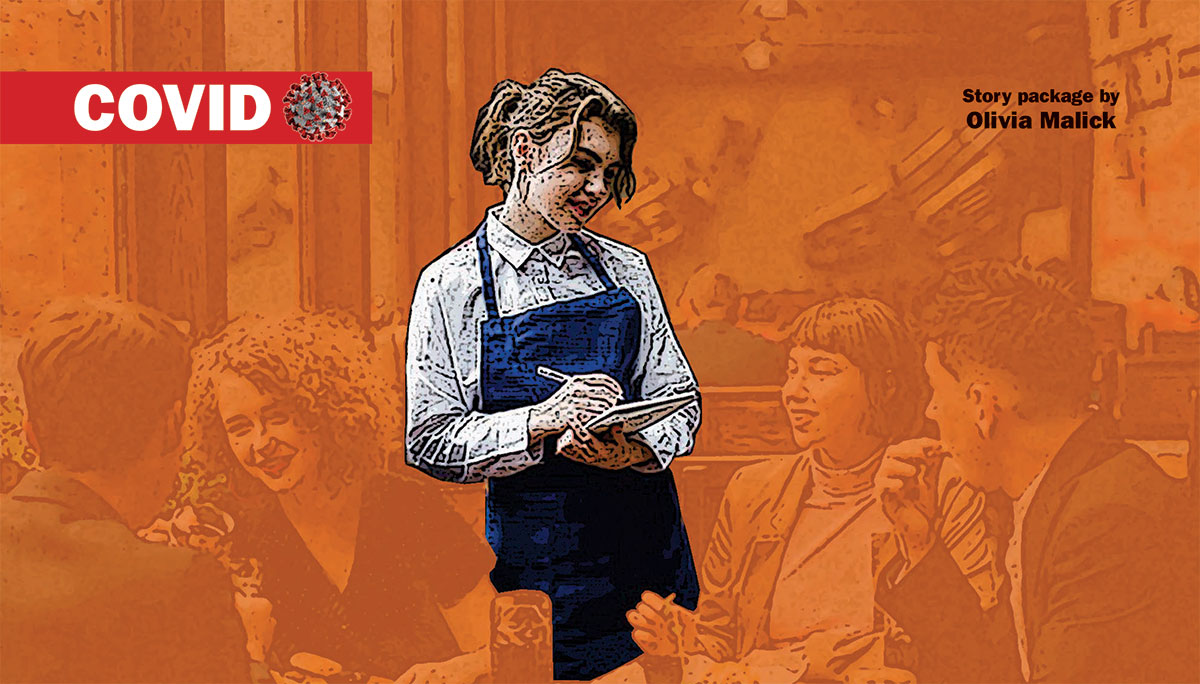
By May of 2020, three months after the COVID-19 pandemic was declared a public health emergency in the United States, the nation’s restaurant industry had lost 5.9 million jobs, according to restaurantbusinessonline.com.
Those workers who remained employed had to take over extra shifts and some had to take pay cuts while enduring sometimes unruly customers. ‘Sally,’ ‘Mary’ and ‘Jane’ are all Lamar students who worked at local restaurants during the COVID-19 pandemic. Their names have been changed for fear of potential retribution from employers.
SALLY
When restaurants in Texas were cleared to open for dine-in services in May 2020 after closing that March, Sally was hesitant to go back to work after being furloughed. Her boyfriend has sickle-cell anemia and she lives with her elderly relatives — she didn’t want to get them sick.
Her general manager reached out to let people know that if they had reservations about coming back to work, the restaurant would accommodate them. But the reality was much different.
“I was not ready to go back, and I expressed that,” she said. “Then, employees were told by management that if we did not come back, we would not have a job anymore. That was obviously threatening, so I pretty much had to go back because that’s my job.”
Sally reluctantly went back to work at a local restaurant that, she said, didn’t follow state or municipal guidelines, such as monitoring capacity limits or strictly enforcing Texas’ then-in-place mask mandate.
“For example, say you were exposed to somebody with COVID,” she said. “They didn’t really care. At one point, there were a few people that had it and were waiting on test results and ended up being positive.
“That was scary, because I’m around people that I can’t give COVID to. It was really stressful, because you want to do the right thing but it’s hard when everyone around you is not doing the right thing.”
The lack of support from management, and difficult customers, made working throughout the pandemic tough, Sally said.
“You have some customers that understand and know you’re understaffed and that you have to wear a mask,” she said. “But on the other hand, we had customers who thought they didn’t have to wear a mask, and we’d have to tell them to leave and they’d get mad.”
Sally said a lot of customers did not seem receptive to the struggles restaurants were facing during the pandemic.
“Most of the time I feel like we have customers that have never worked in a restaurant ever before in their life,” she said. “Nine times out of 10, we were always understaffed and dealing with some of the worst people you could deal with ever. I am out here risking a lot.”
Sally eventually contracted COVID in October.
“When I did have COVID, that was the scariest thing ever, and I was so extremely worried about my boyfriend and grandparents,” she said. “Customers don’t see that because they don’t care.
“They’ll get COVID and they’ll probably still go on with their lives. I don’t think anybody will ever know how it feels until somebody they know gets it and is fighting for their life. Of course, I don’t wish that on anyone, but they won’t know how it feels until something like that happens.”
Sally said that in addition to some customers fighting her over having to wear masks, she was working twice as hard without seeing it reflected in the money she was making. Even on nights when Sally made good money, it didn’t feel worth it for the mental exhaustion that followed, she said.
“People are not feeling as generous as they used to,” she said. “Around Christmas time, usually we have customers who come in and they tip outrageous amounts of money. This past Christmas, the first Christmas we’ve had in this pandemic, was probably the worst holiday season I’ve ever worked in my life.
“If you can’t afford to tip, simply do not go out to eat. It costs nothing to cook food at home, instead of coming to my place of work, sitting in my section making me do this and that for you, with a good attitude — for you to not tip or tip poorly, it’s kind of a slap in the face.”
Sally said there was no support from higher levels of management, either.
“I’m probably most disgusted with the owner, actually,” she said. “When we were down to 50 percent (capacity), it was very busy, and he was in the restaurant and he says, ‘Sit every table.’
“He obviously didn’t care. Another (higher level manager) had COVID and still came into the restaurant without a mask on.”
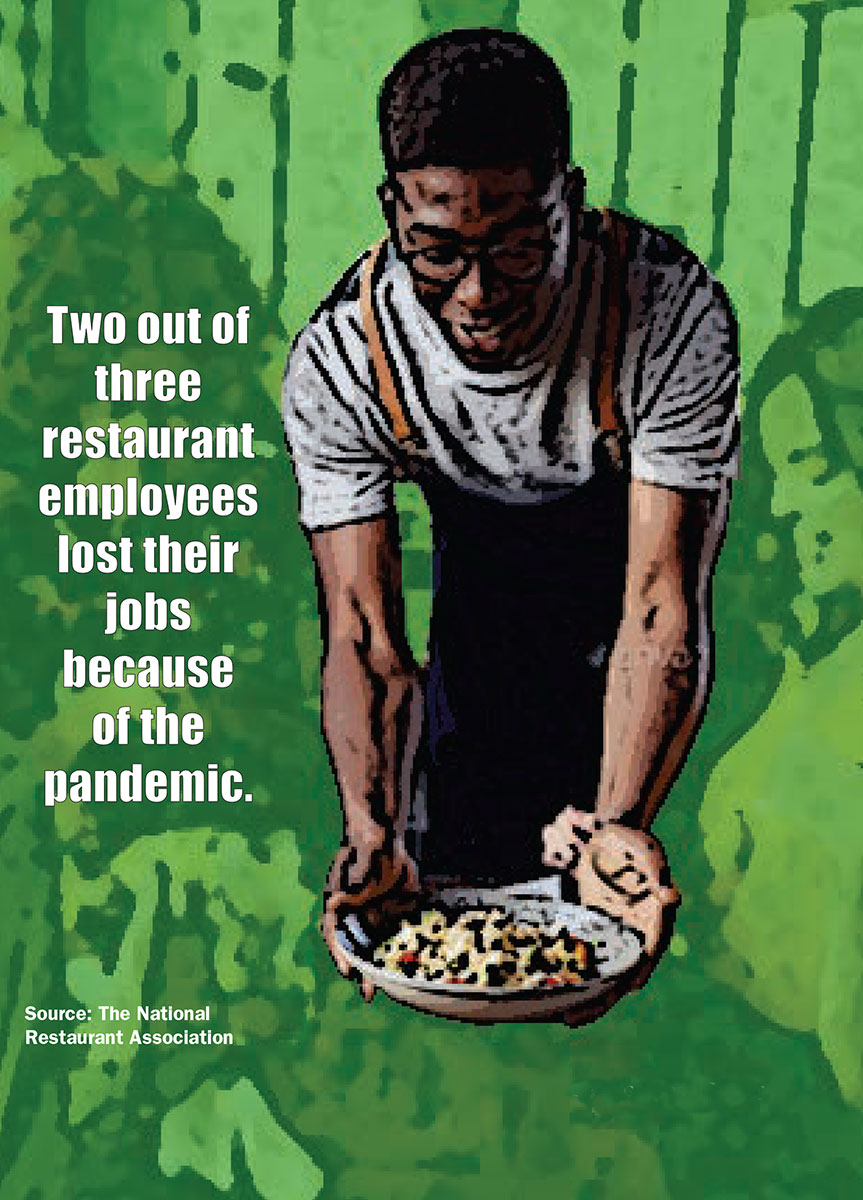
Sally thought about going to the health department to report the COVID guideline violations, but she was scared of retribution and wasn’t certain the health department could even do anything.
“I had discussed it with another coworker of mine, and we thought if we both called and got more people to call, they would take it seriously,” she said. “But I know the kind of power the owner has, and I really thought, ‘I will probably lose my job if I do this.’
“I work in a kind of place where if you see something wrong happening with managers, or anything in that area, and you say something about it, you will be shut down. They do not want to hear about it. You’re going to be in the wrong regardless. This has been going on since I started working there almost three years ago — it’s always been like this.”
When Sally finally contracted COVID, she said management’s response was surprising.
“I was told, ‘You can still come to work, I won’t tell anybody,’” she said. “That’s really messed up. Obviously, I did not go back to work. I quarantined for two weeks, but it made me weary because, ‘Could I be working with somebody who has COVID right now?’”
Sally said management rushed her back to work even though she had mild COVID symptoms and her quarantine period was not over yet.
“Someone telling me that I could come to work and not tell anyone may seem like they care about me in order for me to make my money, but they obviously don’t care about the health of others,” she said. “I could have easily spread that to the whole restaurant, everyone I worked with. Not only that, I heard that they thought I was lying, even though I did send in my, not one but two, positive test results as proof.
“I was being rushed during my quarantine as to when I was coming back, and it was really annoying because I’m trying to focus on getting better and isolating. I don’t want to be dealing with that and I shouldn’t have been dealing with it.”
Sally said that while she didn’t necessarily enjoy her job before the pandemic, it has become almost unbearable since it began.
“It’s terrible,” she said. “Working in a restaurant is already mentally draining enough, but during a pandemic it’s almost off the wall crazy — it’s terrible. I’m always telling my boyfriend or my family about it — I’m al
ways dreading going to work.
“I get it, a lot of people don’t want to get up and go to work. But I don’t think I’ve ever felt this way about a job. It’s almost not worth it. I have thought about looking for something else, but I just can’t risk the money. I don’t think I’ve ever been this overwhelmed and stressed before, and a lot of that does have to do with my job.
“I come home and all I can think about is every negative thing that happened at work, whether it was a customer and their attitude, or just management, or another employee bringing me down.”
Customer service has never been easy, but it’s never been this hard, Sally said.
“Before COVID, it was definitely tolerable,” she said. “I mean, customers were customers. Some are hostile at some points but overall, everyone just wanted to have a good time. We weren’t stressed about anything or having to enforce these rules that most customers don’t want to follow anyway.”
Now that the mask mandate and capacity restrictions have been lifted, Sally said it doesn’t feel like everything has gone back to normal.
“Something feels off and strange,” she said. “I don’t think I’ll ever get that feeling back that I had before the pandemic, of just going to work and knowing it’s going to be busy and dreading it, but still just trying to have a good time and serving a bunch of drunk people. It seems like I should be back home. Something feels off and I don’t really know what it is.”
Sally said she’ll probably never look at the service industry the same and there are some experiences she’s had while working during the pandemic that will stick with her for a long time.
“The numerous times of being yelled at for telling people to simply put on a mask — being cursed out by grown men, watching them slam doors — it will definitely stick with me,” she said. “I feel like I can never go to a manager about any problems again.”
MARY
Mary, who works at a different local restaurant, was one of the few employees retained by her job to work through the dine-in shutdown.
“When the pandemic first started, we didn’t have staff, a lot of us got laid off,” she said. “Basically, only the people who could work in more than one position were allowed to stay. So, it was like six of us doing the job of 20 people — just overworked then arguing with everybody, basically.”
Mary has worked as a cashier at the restaurant for almost five years, but has also worked as a host, server and sometimes line cook when needed.
If there is one thing she gained through the pandemic, it’s patience, Mary said.
“I had to (have patience), because the biggest thing was when masks were enforced, you had a lot of people coming in not wanting to wear them,” she said. “We had one man come and rebuke the store in the name of Jesus. We’ve gotten into screaming matches with people just about masks.”
Mary said that once the restaurant re-opened for dine-in, she became increasingly anxious about contracting COVID-19.
“I got nervous when things started to reopen,” she said. “We started having more people coming in and I knew people weren’t going to social distance. We had signs on tables separating them, and people would just move the signs.
“I was nervous for my health because people got sick. We had people at our job catch it, because they were going places. Then we’d all have to go get tested and have to shut down the store.”
Mary said the restaurant’s management was strict about enforcing the mask mandate when it was still in place, but they weren’t as cautious as they could have been.
“We had a manager who came to work knowing that he had to go take a COVID test because he didn’t feel good,” she said. “He had a fever of 102 degrees and was coughing but didn’t tell anybody that. He left on his lunch break, came back and was serving food and helping out until another manager came up and told him to go home.
“We asked why and (were told) he tested positive. So, he knew he had to get a test, tested positive, still came back to work, and HR didn’t fire him. He’s still working with us — he tested negative and they let him come back. He put everybody — not just us, the customers — he put everybody at risk that day.”
Mary said dealing with customers was tough, especially when it came to enforcing the mask mandate.
“When things started opening back up, there was more animosity,” she said. “We knew that we were going to have at least one or two customers a day that we were going to have to tell them, ‘Hey, wear a mask,’ and getting into arguments — especially people with MAGA hats always coming in not wanting to wear masks.
“They would say, ‘My president, Donald Trump, he doesn’t wear one, I don’t want to wear one.’ Some of our coworkers also didn’t agree with the mask mandate and you can’t work here without wearing one. So, there were a lot of arguments because there were so many different beliefs about it.”
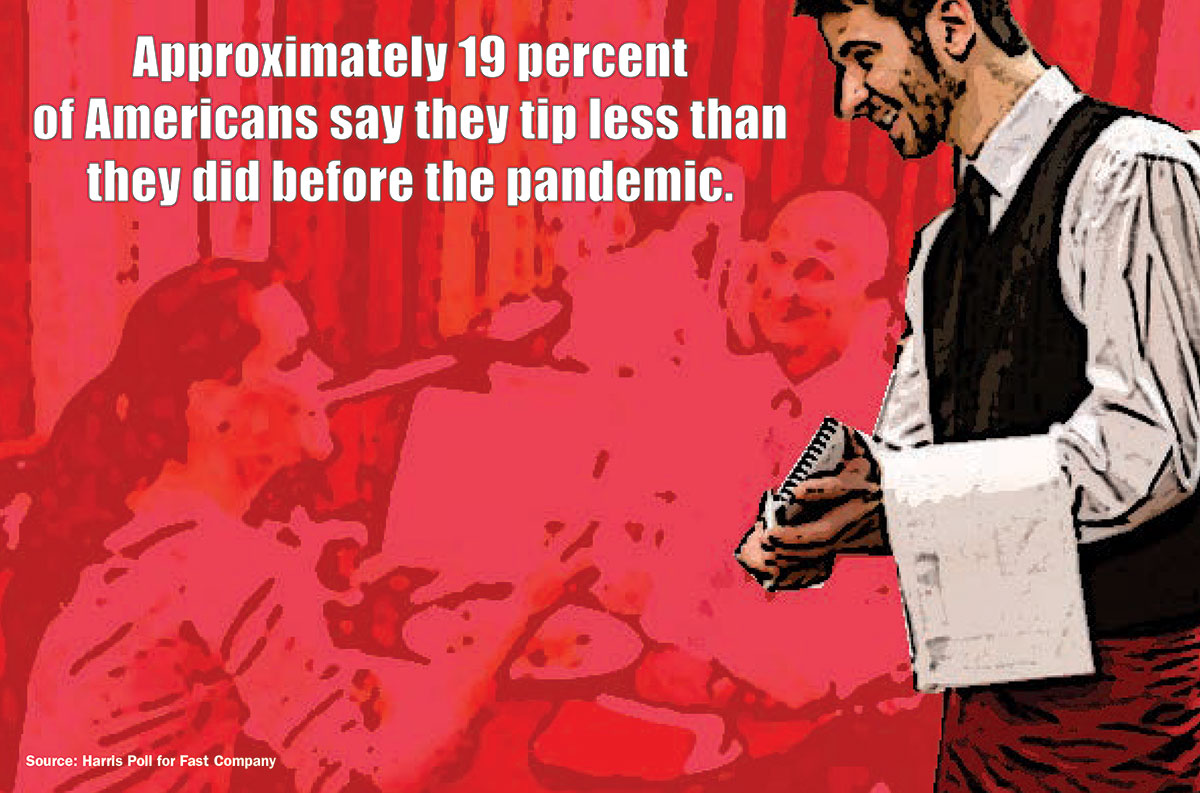
Mary said about 75 percent of customers were nice and understanding.
“When the stimulus would hit, they would leave nice tips,” she said. “A lot of people would thank us for staying open during the pandemic and coming to work. We had one lady who would come every day and give us pretty masks.
“But, of course, you had people coming in complaining about how long things were taking. We were understaffed, so it’s going to take longer to get things done because you don’t have as many people doing the same amount of work.
“When we were doing to-gos only, we started charging 50 cents for food packaging because we were using more of it. One man said, ‘Are you charging me for staying alive?’ No, we’re not, you know, we just have to make a living. But I try to focus on the 75 percent.”
Mary said, for the most part, she was used to dealing with difficult customers, but there seemed to be a lack of understanding during the pandemic.
“I had already been there five years so I knew that people could be nasty — I did not know how nasty,” she said. “I did not know how much we really don’t communicate with each other, how much nobody really tries to step into your shoes.
“There’s almost no human decency sometimes. I consider myself to be very calm — I live with seven people, I am patient.”
Mary said she did feel the restaurant did a good job of alerting its employers when someone got sick.
“Our head manager was serious about it because his daughter has sickle cell, she is high risk,” she said. “So, he took this to heart. If anybody tested positive, if anybody even looked sick, he’d make them go home get tested. And if you were in that area with (them), he’d make you get tested and they would sanitize everything.”
In addition to the stresses of working through the pandemic, Mary said there was the added stress of being a student and keeping up with her classes.
“I’m working over 40 hours a week and I have these classes,” Mary said. “And then in the middle of all that, money got short, so both my parents ended up losing their cars.
“So, I’m driving everybody everywhere, driving to work, trying to get stuff done to the point where I’m listening to my classes on my way to work, just listening to them while I’m driving around and getting points off because, you know, you’re not participating, your camera’s not on. I’m just tired.”
Mary said it took a toll on her mentally and physically.
“I lost weight because I almost couldn’t eat at some point,” she said. “There’s a way to explain it to your professors, but I really didn’t even try to because they’re going to be like, ‘Well everybody’s going through something.’ But they’re giving twice the work and I’m already working twice as hard (at the restaurant). I made it through, but it wasn’t fun to get through.”
The physical, mental and financial stresses added up and culminated in an argument with one of her managers, Mary said.
“me and a manager got into a giant argument — it was the straw that broke the camel’s back,” she said. “We were making plates and I made something twice on accident. It was Sunday, and Sunday’s are busy — we’re understaffed, and I’m in school, stressed about school, stressed about money, stressed about home, stressed about work. And (my manager) yelled at me over chicken.
“I just remember stopping and just going completely off. I was, like, my parents don’t talk to me like this, you’re not going to talk to me like this, and, honestly, at this point, we can take it outside. I’m not violent, but we were coming to blows.
“My other manager had to pull me to the side and tell me, “I’m not going to write you up, because you’ve been here so long, and I watched what happened. But I am going to tell you this, don’t let someone take you outside of your character like that.’
“I’m 21 getting into arguments with 40-year-old men. I have always been the nice one, I have never raised my voice. But it’s hard.”
JANE
Jane worked at her local family-owned gas station complex which consisted of a restaurant, convenience store and a sno-cone stand. She said that when the pandemic began, it felt like the apocalypse was happening.
“There was a definite tone shift, for sure,” she said. “We had the curfew, nobody was allowed to go out. For a while, it seemed everybody was scared of this pandemic. It was very busy for us because everybody was stocking up on gas, almost like a hurricane, stocking up on gas and food and water. And then it was just kind of dead. Nobody would come in, it seemed like there were hours without any customers.
“The restaurant closed beside us for a couple of weeks but everyone was cross-trained so no one had to lose their job. We ended up doing takeout orders and drive-thru only. That was extremely bizarre, because we were busy all the time — we were one of the only places that was open at the time doing that. We were offering family meals for discounted prices and, I'm not even joking, wait times for those family meals got into two and three hours because everybody was ordering so many.”
Jane said her boss was outspoken about his beliefs regarding the COVID-19 pandemic.
“(The business) was privately owned by a man who is very anti-mask,” she said. “He wouldn't dissuade us from wearing a mask, however, he went out of his way to tell us that it wasn't necessary. And everybody that came into the store-gas station-restaurant, was not required to wear a mask for the entirety of this pandemic. That was something that I never agreed with and, eventually, was why I left the job.”
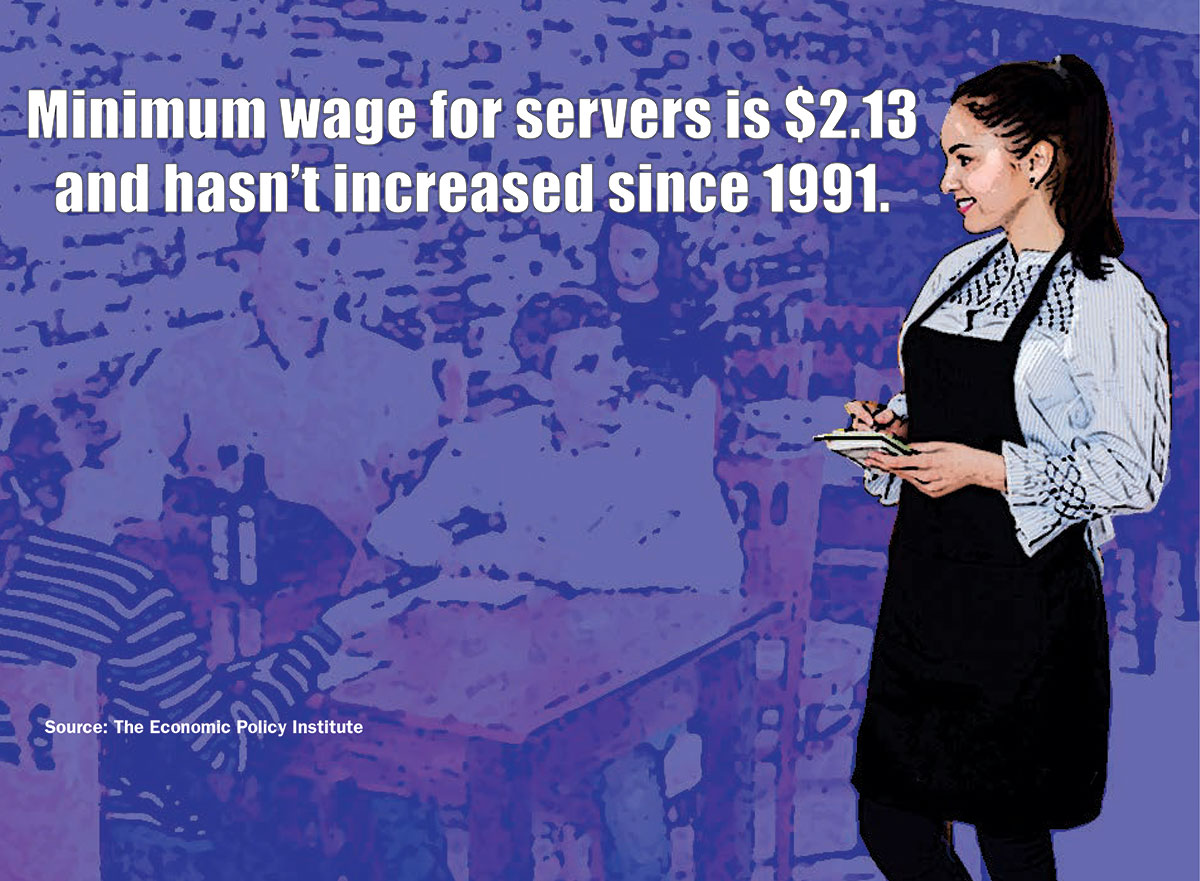
Jane left the job in November and started at a retail store in January.
Jane said she didn’t face a lot of customer backlash at gas station during the pandemic because her owner never required masks, even though it was mandated by the state of Texas from July 2020 to March 2021.
“Everybody was happy not to wear a mask,” she said. “We were cleaning and doing all that extra kind of work, but we didn't have any plexiglass up and I just felt that it wasn't safe for us employees. As far as customer service went, everybody was happy. I was constantly getting, ‘Oh, it's so good that y'all aren't requiring masks’ — completely different now from my current job.”
Local law enforcement did nothing to reinforce the mandate, either, Jane said.
“So, funny enough, we were a gas station by the local high school,” she said. “A lot of times, we’d get security from the high school, and also a lot of police officers that’d come in with no masks.
“They definitely were not enforcing the mandate whatsoever. The one health inspection that we did during the pandemic was after the restaurant had opened back up to 50 percent capacity. Even though the people at the restaurant, workers included, didn't have to wear a mask, it was a virtual health inspection, so my manager made everyone wear gloves and masks, even though that wasn't required initially.
“Basically, the health inspector ‘walked through’ and made us show everything that was going on. I feel like it was just very easy to falsify, because the things that the health inspector saw weren’t things that were happening every day.”
The retail store where Jane works now heavily enforced masks during the mandate and still encourages them, she said, adding that she has faced more difficult customers working there as a result.
“If somebody came into the store without a mask, we were to ask if they had a mask with them,” she said. “If not, we provided a mask. Lots of times people would storm out, or get in our face and be, like, ‘Well, you've lost a customer,’ and things like that.
“Recently, before the mask mandate lifted, it was during our Valentine's Day rush. It was just a couple days before Valentine's Day, and these two older men had come in. They had worn their masks in, but once they approached the counter with the plexiglass where I was, one gentleman pulled his mask down while he was talking. I didn't say anything, personally, because I'm just not confrontational.
“But it did bother me and one of my coworkers came up behind me and she was, like, ‘Sir, please, your mask, (lift up your mask),’ and he threw his wallet down on the counter in front of me and turned to the man that he was with and he was like, ‘Pay for my shit. I'm getting the f--- out of this place with all these f---ing bitches.’
“I was so taken aback. I finished that transaction and I just had to go on break, because I was like, ‘What the heck was that?’ That was the first time I have been verbally cussed out like that because of masks. Otherwise, people are normally very accommodating. A lot of people do try to come in without a mask and we have to ask them if they have one, and most of them turn around and go get masks out of their car. But we did have quite a few people who tried to fight us on that.”
While her boss at the gas station didn’t require masks, Jane wore one, though she admits that she probably wasn’t as cautious as she should’ve been.
“When I was on the front counter, I wore one,” she said. “But for the majority of the time while I was there, after COVID at least, I was promoted to an office assistant position so it would just be me and the manager in the office. So, most of the time, I wouldn't wear it just because I was around this person every day. And probably being in that environment, I wasn't taking it as seriously as I should have.”
Numerous coworkers tested positive for the virus and were asked to stay home, following guidelines, Jane said. But they were asked to keep quiet about their diagnoses.
“(Management) didn't want it to get back to the restaurant or back to the business because they were afraid that people would have hard feelings about people being sick there,” she said. “So, while, yes, they were asked to stay home and they were respectful of that, they were also asked to remain quiet.”
Jane said other employees were not told if a coworker had tested positive, however, which she did not agree with.
“The only reason that I knew was because I was an office assistant,” she said. “Even then, I wasn't directly told. I was just there for the phone calls. I always, from the very beginning, thought it was wrong.
“Even though I felt like I couldn't say anything, it just never sat right with me. So many people got COVID, it's not going to be bad for the business or whatever. Just something about them telling (employees) to be quiet or not telling people. I mean, we all ended up finding out because these people would be gone for two and three weeks at a time, but still be on the schedule. So, we're, like, well, they're not fired, so they must be sick — everybody kind of figured it out anyway. But it was a respect thing — not being respected enough to be told, bothered all of us.”
Jane’s fiancé and grandmother, whom she lives with, both have asthma. She said she was constantly worried about exposing them to the virus.
“I was terrified,” she said. “For a while, I was taking so many vitamins because I was so scared. I still do. We always had Germ-X and things like that provided, and I was constantly using that, always trying to stay six-feet back away from people. I realized that a lot of times people didn't respect that kind of space and I would actually have to ask them to step back, because I just wasn't comfortable.
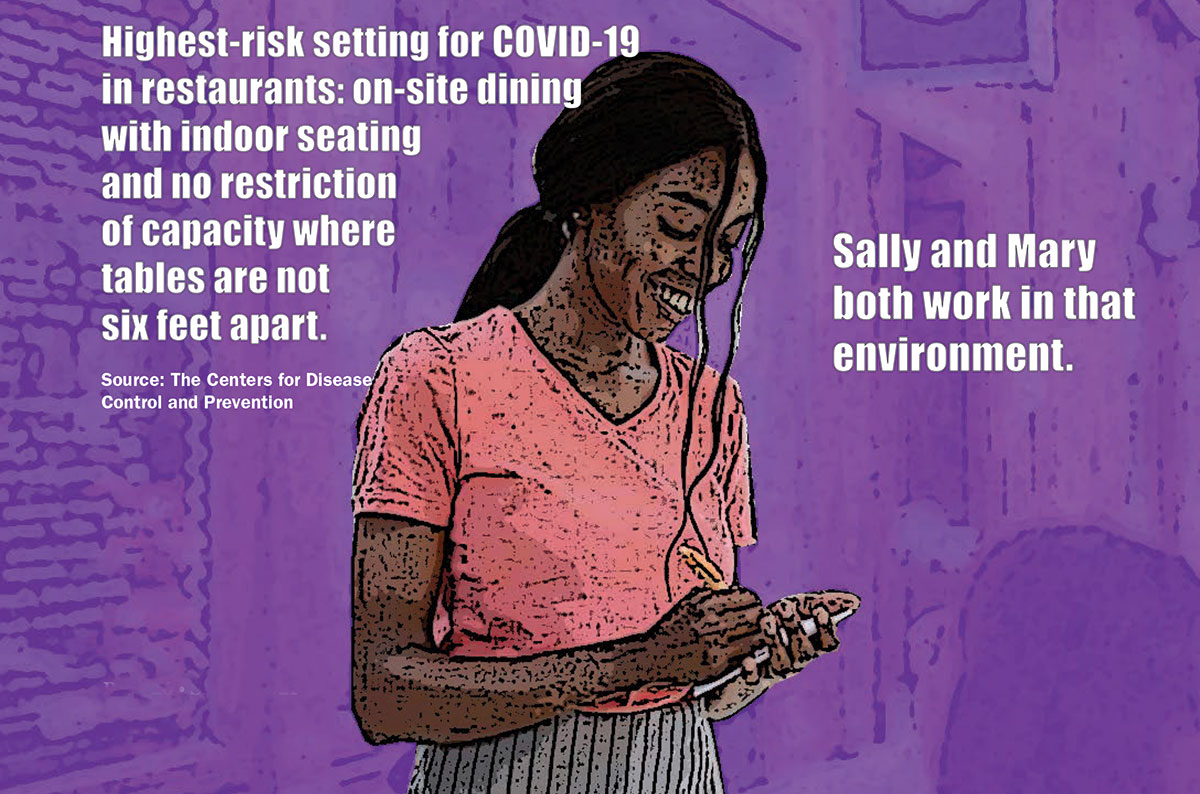
“I wasn't scared to get sick myself, I was scared for them to get sick, so I was just doing whatever I could. Looking back, I don't like a lot of the things that I did. I felt like it wasn't enough, probably. But I was in an environment that said that masks didn't need to be a thing. Everybody hated them. I think I really took a part of that to heart. I guess there's partial blame on myself there, too.”
By April 19, all adults in the United States will be eligible to receive the COVID vaccine. As more people are vaccinated, more people will be going out to restaurants all across the country.
Throughout the pandemic, there have been countless stories of people coming together to show their appreciation for frontline workers in the health industry. While the sacrifices and work done by healthcare professionals cannot be denied, restaurant workers have become the forgotten members of the frontline.
When disasters occur, communities can band together to recover. As the stories above have shown, the coronavirus pandemic hasn’t always brought out the best in people.
The experiences of Sally, Mary and Jane are just three of the many stories told by workers in the service industry — the stories of hardworking people just trying to live.
Remember them — and tip your servers.
To read the full edition of UPbeat, click the image below.

